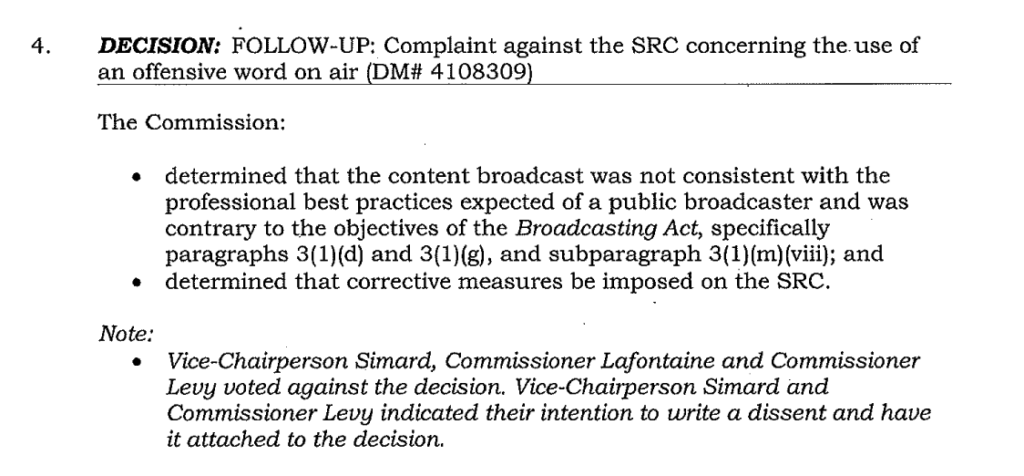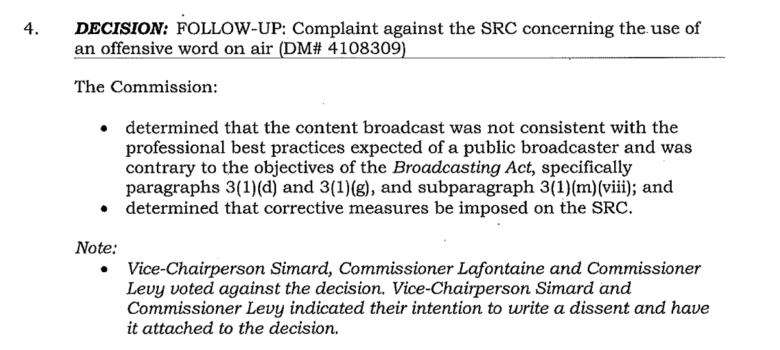Days after Bill C-11 passed in the House of Commons, the CRTC released its decision involving Radio-Canada and the use of the N-word in a broadcast. The decision sparked an outcry in Quebec and raised concerns that the Commission did not feel constrained by the Charter of Rights and Freedoms in its decision. Indeed, given that the majority of the Commission ignored the Charter and freedom of expression altogether, the decision signalled how Bill C-11 could be used to regulate Internet content the CRTC deems contrary to Broadcasting Act policy objectives. Two of the lingering questions with the case involved timing and who had been involved: the complaint had reached the CRTC in 2020, yet the decision was released nearly 18 months later only after Bill C-11 passed the House of Commons. I asked the CRTC for the full commission minutes to better understand who was involved in the case and when the issue was debated and decided. The Commission responded that all of this information was only available through the Access to Information Act. While I find this level of secrecy astonishing – there is no reason for the Commission to not publish who was involved in decisions and to make its minutes publicly available by default – I filed the request.
Yesterday, I received the answer (full ATIP can be accessed here). The complaint was filed with Commission in November 2020. The Full Commission first discussed the case in July 2021, choosing to defer its decision.

CRTC Full Commission Meeting Record, 13-14 July 2021, obtained via ATIP
The issue came up again in November 2021 in front of the full commission: Scott, Anderson, Barin, Desmond, Lafontaine, Laizner, Levy, Naidoo, and Simard. The decision was more divided than the CRTC release suggested as not only did Vice-Chair Simard and Commissioner Levy write dissents, but Commissioner Lafontaine also voted against it. That left Scott, Anderson, Barin, Desmond, Laizner, and Naidoo supporting for a 6-3 decision.

CRTC Full Commission Meeting Record, 2-3 November 2021
I’m advised by a former CRTC commissioner that writing decisions, dissents and translations can take several months. Yet in this case, the decision remained under wraps with the Commission for nearly eight months before it was publicly released. By contrast, the same November meeting reached decisions on telecom paper billing, which were fully released in February 2022.
Why did it take nearly eight months for the CRTC to release this decision that had sparked real division among the Commissioners? Perhaps there is a good answer, but it is hard to ignore that the Commission and Scott remained silent for months while the very issue raised by the case – CRTC regulation of content and freedom of expression. – was front and centre in Bill C-11. In fact, the government talking point that the CRTC does not regulate was raised repeatedly with Canadian Heritage Minister Pablo Rodriguez telling the committee “the CRTC, whatever it does in regulations, has to respect freedom of expression.” Professor Pierre Trudel, one of the government’s star witnesses, told the committee “we can’t really take these fears of alleged censorship seriously. The Broadcasting Act prohibits the CRTC from infringing on freedom of expression.”
Meanwhile Scott – while knowingly sitting on the Radio-Canada decision that had been decided many months earlier – was asked at committee:
Has the CRTC ever regulated actual broadcast content—what is said or what is seen—rather than just its distribution?
His response:
No. We obviously attempt to ensure that the objectives of the Broadcasting Act are met. We don’t regulate individuals. We regulate broadcasting undertakings, and they abide by a regulatory framework that we establish. We don’t dictate content, neither what is broadcast nor what is watched, obviously, by Canadians.
That response was misleading at best given the Radio-Canada decision, which did regulate what was heard and the majority did not even consider the freedom of expression implications. The CRTC had decided the case months before Bill C-11 was introduced, yet it kept it secret the entire time the bill was before the House, choosing only to release it after the bill had passed the House and both the House and Senate were on break for the summer. The fact that the CRTC sat on the decision for months surely undermines public confidence, raising questions about its independence and whether it can be trusted to develop Internet-based regulations that could have an enormous impact on online expression.








The CRTC decision does not inform us about the Commission’s ability to regulate content or Bill C-11. It is likely that the “N” word decision was delayed so as not to cast a shadow on the CRTC’s laissez-faire CBC/Radio-Canada licence renewal decision, released seven days earlier.
Section 3 of the Broadcasting Act says that the programming originated by broadcasting undertakings (which includes Radio-Canada) should be of high standard. In most instances, the CRTC works with the Canadian Broadcasting Standards Council (a private sector self-regulatory organization) to ensure this is the case by examining complaints after a program has been aired. The Council administers CRTC industry codes covering issues relating to ethics, violence on television, equitable portrayal, journalistic ethics, and cross-media ownership that set out guidelines for television and radio programming content. The Council may impose minor penalties on broadcasters that infringe the codes. The Commission takes on those cases that the Council is unable to resolve to the complainant’s satisfaction.
The CBC/Rado-Canada is not a member of the Council and has its own complaints’ resolution process. Once again, CBC /Radio-Canada works on a complaints basis after the programming has been aired and the CRTC takes on those cases that the Corporation is unable to resolve to the complainant’s satisfaction. This is what happened with the “use of an offensive word on air” by Radio-Canada. A listener complained and the CBC was unable or unwilling to resolve the issue. After examining the program, the CRTC asked for an apology and how Radio-Canada intends to mitigate the impact of the “N-word” in the program in question which continued to be available online and on Radio-Canada’s online platform.
Section 2(3) of the Broadcasting Act itself says the “Act shall be construed and applied in a manner that is consistent with the freedom of expression and journalistic, creative and programming independence enjoyed by broadcasting undertakings.” The CRTC apparently thought that was what it was doing in this case. But the decision says nothing about how Bill C-11 could be used to regulate Internet content. Clearly, Michael Geist does not understand how the ex post complaints process works at the Commission. It has nothing to do with previewing or regulating content ex ante.
This blog is much ado about nothing.
I feel as if I’ve mysteriously moved to China or Russia except the taxes are way higher…